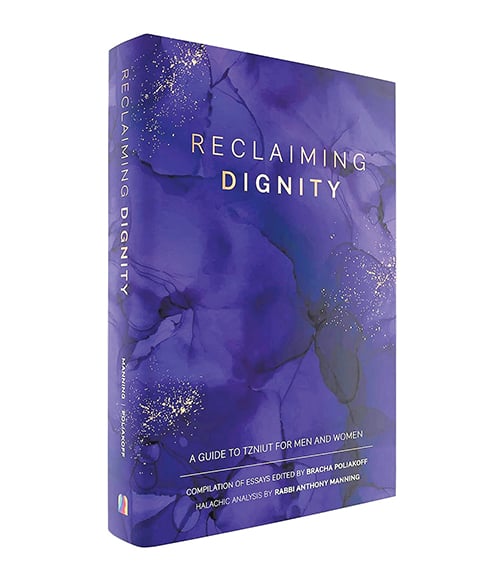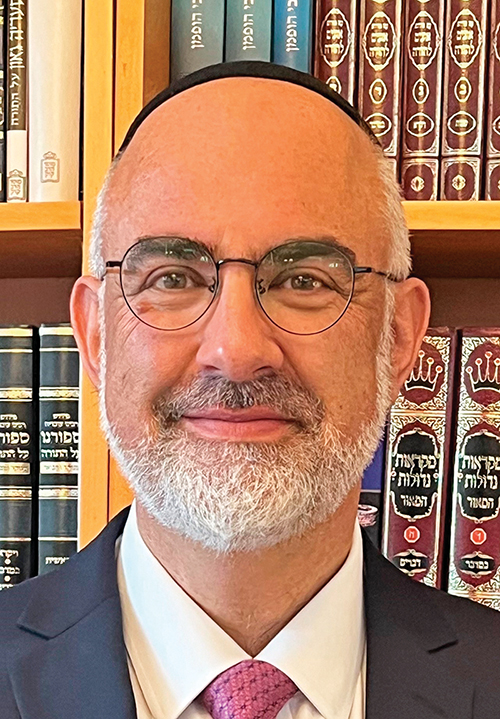
(Courtesy of PTI) Tzniut. It’s not just for women. It’s not just clothing. It’s not just to ensure propriety between men and women. Rabbi Avraham (Anthony) Manning considers tzniut “a much misunderstood concept.” He will share his thoughts on Motzei Shabbat November 30, 8 p.m. at a reception for both men and women, sponsored by Passaic Torah Institute and Neve women’s program.
The first 6000 copies of Rabbi Manning’s book, ”Reclaiming Dignity: A Guide to Tzniut for Men and Women” flew off the shelves and it is now in its fifth printing. The first part of the book contains 26 essays, almost all by women from a broad range of hashkafot—Chabad, Chassidish, Beis Yaakov, Yeshivish, Centrist/YU, Modern Orthodox and Religious Zionist. They include Sivan Rahav-Meir, Rebbetzin Tziporah Heller-Gottlieb and tzniut marathon runner Beatie Deutsch, among others. Some, while not challenging the idea itself, talk frankly about how tzniut is taught and their personal and intellectual struggles with it.
The second part is Rabbi Manning’s 200 pages of well-sourced halachic analysis, which is groundbreaking for its ability to tease apart several disparate concepts and clarify readers’ confusion of tzniut and ultimately strengthen our commitment. In the process, he paints a much bigger picture of tzniut that is more universal in its obligation for both men and women. As one reviewer put it, the book “bridges so many different communities and philosophies while inserting much needed egalitarianism into the tzniut conversation.”

Approbation for the book comes from across the Orthodox spectrum.
“”I was ecstatic to find myself reading a masterpiece of a scholarly work, carefully researched and so well written,” said Rabbi Yitzchak Berkovits.
“A most important work for those seeking a comprehensive and intelligent understanding of this crucial aspect of Torah life,” observed Rabbi Ahron Lopiansky
“The book clarifies many different issues on the topic of tznius … Anyone who reads it, even a Torah scholar, will encounter new ideas,” hailed Rabbi Hershel Schachter.
“Rabbi Manning manages to show the special beauty of the world of tznius in a way that will motivate people and give them the impetus to be observant in this area,” praised Rabbi Yosef Zvi Rimon.
Rabbi Manning points out that Chazal use the term tznuyim over 100 times, and rarely refers to a person’s dress. Rather the Hebrew root tzadi-nun-ayin refers to a number of interrelated concepts: self-respect, individuality, inner-directness. The best-known Torah verse employing the same Hebrew root is the prophet Michah’s declaring, “and walk humbly [v’hatzneia leches] with your God” (Michah 6:8), and applies equally to men and women. As one essayist put it, the book “provides a means of imbuing our clothes with the depth of tznius as opposed to having them define tznius.”
Surprisingly, Rabbi Manning holds that the idea of tzniut is separate from what other people see. Tzniut is an awareness of always being in Hashem’s presence, even when we’re alone. The sole motivation of the one who walks humbly with Hashem is that relationship. The approval or opinions of others means nothing.
Tzniut is the antithesis of all those on social media for whom there is nothing too trivial to be shared with the world and who define themselves by how many “likes” they receive. The more one’s thoughts are shared with others, the less power they have to affect us deeply.
The reception is hosted by Alan and Basya Gutmann 56 Allwood Place, Clifton. For details contact 973-594-4774 or ptitorah@gmail.com. PTI offers five levels of learning for men and women, seven days and evenings a week, from the complete beginner with no background to the advanced scholar. The full schedule can be found on https://pti.shulcloud.com.










